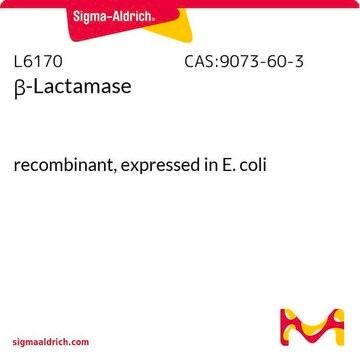L3045
β-Lactamase from Pseudomonas fluorescens
lyophilized powder, recombinant, expressed in E. coli
Sign Into View Organizational & Contract Pricing
All Photos(1)
About This Item
MDL number:
UNSPSC Code:
12352204
NACRES:
NA.54
Recommended Products
recombinant
expressed in E. coli
Quality Level
form
lyophilized powder
enzyme activity
7.5-15 units/mg solid
shipped in
wet ice
storage temp.
2-8°C
Unit Definition
One unit will hydrolyze 1.0 μmole of benzylpenicillin per minute at pH 7.0 at 25 °C
Physical form
Lyophilized powder containing potassium phosphate and sodium bicarbonate
Storage Class Code
11 - Combustible Solids
WGK
WGK 3
Flash Point(F)
Not applicable
Flash Point(C)
Not applicable
Certificates of Analysis (COA)
Search for Certificates of Analysis (COA) by entering the products Lot/Batch Number. Lot and Batch Numbers can be found on a product’s label following the words ‘Lot’ or ‘Batch’.
Already Own This Product?
Find documentation for the products that you have recently purchased in the Document Library.
Teerawit Tangkoskul et al.
The Southeast Asian journal of tropical medicine and public health, 43(6), 1461-1469 (2013-02-19)
We performed extended-spectrum beta-lactamase (ESBL) phenotypic testing and molecular characterization of three ESBL genes (TEM, SHV and CTX-M) and susceptibility testing by Clinical Laboratory Standards Institute (CLSI) disk diffusion method against three cephalosporins (ceftriaxone, ceftazidime, cefepime) and a cephamycin (cefoxitin)
Siriluck Anunnatsiri et al.
The Southeast Asian journal of tropical medicine and public health, 43(5), 1169-1177 (2013-02-26)
Escherichia coli producing extended spectrum beta-lactamase (ESBL) has emerged as a worldwide, public health problem. The aims of this study were to determine the incidence of ESBL-producing E. coli septicemia and evaluate the factors associated with the infection and the
MMWR. Morbidity and mortality weekly report, 62(6), 108-108 (2013-02-15)
On August 16, 2012, the Colorado Department of Public Health and Environment was notified of two patients at an acute-care hospital in Denver with carbapenem-resistant Enterobacteriaceae (CRE), specifically Klebsiella pneumoniae (CRKP), isolated from respiratory specimens during July-August. Both isolates produced
Grace Yim et al.
Canadian journal of microbiology, 59(2), 110-116 (2013-03-07)
Microbial populations in wastewater treatment plants (WWTPs) are increasingly being recognized as environmental reservoirs of antibiotic resistance genes. PCR amplicons for plasmid-mediated quinolone resistance determinants qnrA, qnrB, and qnrS were recorded in samples from a WWTP in Vancouver, British Columbia.
Seung Bok Hong et al.
Journal of medical microbiology, 62(Pt 6), 836-844 (2013-03-23)
The co-existence of carbapenemase, 16S rRNA methylase and mutated quinolone resistance-determining regions (QRDRs) can cause serious difficulty in treating infections with multidrug-resistant Acinetobacter baumannii. In this study, we aimed to determine the mechanisms of imipenem, amikacin and ciprofloxacin resistance in
Our team of scientists has experience in all areas of research including Life Science, Material Science, Chemical Synthesis, Chromatography, Analytical and many others.
Contact Technical Service







